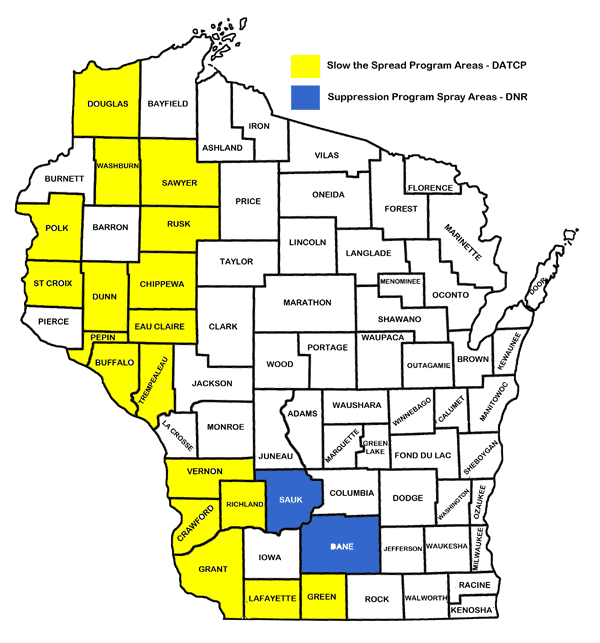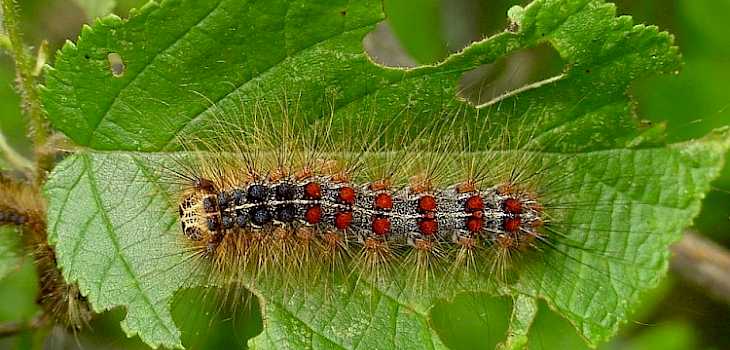Gypsy Moth Larva (caterpillar)
Residents of 20 western and central Wisconsin counties can expect to see and hear loud, low-flying planes as early as sunrise starting in early May. Small, yellow planes will be treating for invasive gypsy moth caterpillars. These non-native pests defoliate trees during their caterpillar stage, causing stress and potentially tree death. The DNR and DATCP are leading the treatment efforts against the gypsy moth.
“These aerial treatments are the most efficient and effective method to delay the risk associated with gypsy moth outbreaks,” says Christopher Foelker, gypsy moth control program manager. “Where this insect is well established in eastern North America, it has been a periodic public nuisance and damaging forestry pest.”
The DNR and DATCP will be treating the following counties in 2017: Buffalo, Chippewa, Crawford, Dane, Douglas, Dunn, Eau Claire, Grant, Green, Lafayette, Pepin, Polk, Richland, Rusk, Sauk, Sawyer, St. Croix, Trempealeau, Vernon, and Washburn.
The gypsy moth has a wide range of harmful effects on local communities. The cost of removing dead trees around a house can range from several hundred to over one thousand dollars and the loss of mature trees decreases property value. During the spring and summer, caterpillars shed bristly skin multiple times while growing. Bristles from the cast skins can become airborne and irritate eyes, skin and the respiratory system. People will develop a rash if they come in contact with the bristles.
About the Gypsy Moth Programs
Stay updated
Treatment dates and times are weather dependent. Sign up to receive e-mail notifications about treatment plans at http://gypsymoth.wi.gov. You can listen to a recorded message about our plans by calling the toll-free Gypsy Moth Information Line at 1-800-642-6684. Press menu option 1 for updates.
Treatments are expected to begin in southern Wisconsin in early May and end in northern Wisconsin during August. View maps of the specific treatment areas online at http://gypsymoth.wi.gov.
Treatment applications will be completed by two programs:
- The Slow the Spread Program—conducted by the Department of Agriculture, Trade and Consumer Protection, focuses its efforts in western Wisconsin where gypsy moth populations are low or just starting to build for the first time. The objective is to slow the westward spread of gypsy moth. This year’s Slow the Spread treatments are planned in the following 18 counties:
Buffalo, Chippewa, Crawford, Douglas, Dunn, Eau Claire, Grant, Green, Lafayette, Pepin, Polk, Richland, Rusk, Sawyer, St. Croix, Trempealeau, Vernon, and Washburn - The Suppression Program—conducted by the Department of Natural Resources, serves mainly eastern and central Wisconsin where gypsy moth is well established. In these counties, treatments are applied to reduce the number of caterpillars and prevent damage from very high populations. This is a voluntary program that works with landowners and local governments. Two Suppression Program treatments are planned this year in Dane and Sauk counties.
Know what to expect
Timing
- Treatment applications depend on favorable weather conditions -- calm winds, no precipitation and high humidity. Planes may start applying as early as 5 a.m. The planes fly very low and loudly over treatment sites and surrounding areas. Planes will continue until the completion of the day’s plans and as long as weather conditions remain favorable. Applications may last into the late morning or afternoon and can occur any day of the week, including weekends.
Treatments
- Most sites will be treated with Foray, which contains Bacillus thuringiensis var. kurstaki (Btk). Btk is a naturally-occurring soil bacteria that kills gypsy moth caterpillars when they ingest it.
- Btk is not toxic to people, bees, pets or other animals. However, some people with severe allergies may wish to stay indoors during nearby treatment applications or avoid areas to be treated on the day it occurs.
- The formulation of this bacterial insecticide used by the state’s cooperative gypsy moth program is listed with the Organic Materials Review Institute as acceptable for use in certified organic food production.
- The Slow the Spread program will also apply an organic, biodegradable gypsy moth mating disruptor to additional sites in western Wisconsin between mid-June and mid-August. The pheromone in the mating disruptor makes it difficult for male moths to find female moths in low, isolated populations, preventing reproduction.
For more information about the programs or gypsy moths, visit the website http://gypsymoth.wi.gov. Or, call the toll-free Gypsy Moth Line at 1-800-642-MOTH (1-800-642-6684) to hear a recording of the programs’ current treatment plans or talk to staff.

Last Update: Apr 25, 2017 12:03 pm CDT
















